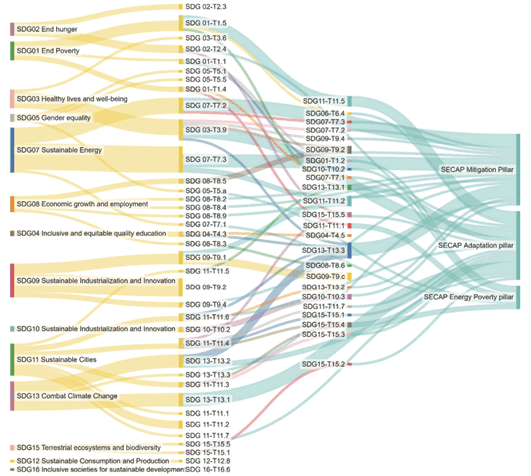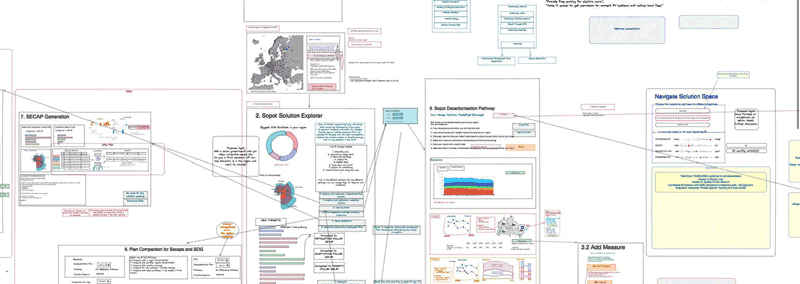by Christiane Walter (PIK), Luis Costa (PIK) and Sara Dorato (T6)
LOCALISED is a four- year H2020-funded research project (October 2021 – September 2025) that develops, in a co-design process, tailored end-user products and services for local and regional policy-makers, administrations, businesses and citizens, to speed up sub-national decarbonisation processes while considering climate risks and adaptation needs. The flagship outputs are the Decarbonisation Profiler and the Net-Zero Business Consultant, providing information for all NUTS3-regions in Europe, currently under development.
Existing European information platforms supporting a shift to a net-zero energy system have so far been limited in providing information for promoting this transition and only target the national level. For this reason, LOCALISED is designed to close the information gap between national-level decarbonisation plans and local needs for planning and implementing an energy transition towards net-zero while accounting for remaining adaptation. The project develops tailored regional data on energy and climate impacts that are incorporated into information tools for regional governments, municipalities and businesses that support regional decarbonisation and adaptation to climate change. In doing so, the LOCALISED project contributes to the European Green Deal’s goal of a fair and equitable reduction of net greenhouse gas emissions by at least 55% by 2030 (compared to 1990 levels), leaving no one behind. Up to August 2023, LOCALISED has supported cities with information to fill in mandatory data for Sustainable Energy and Climate Action Plans (SECAPs); providing a database of potential mitigation as well as adaptation measures and suitable, related instruments; screening business vulnerabilities and potential technological business solutions; and integrating a strong social perspective in the tools to be developed.
A library of 54 decarbonisation pathways covering all EU Member States has been developed, based on the Long-Term Strategies by 2050 submitted by EU Member States. The library consists of suitable pathways allowing net-zero by 2050 covering multiple aspects of the energy/economy, including: vehicle fleet, residential building renovation, energy demand by carrier, energy production by technology, agriculture or industrial production. To facilitate data access, a database and API have been created, as well as a method for downscaling national-level energy models to NUTS3-regions. This combined methodology and tool will help to close the persistent gap between EU policies, national strategies and regional implementation of climate plans.
In addition, a decision tree methodology has been developed to classify climate actions as options, measures, or instruments: 314 adaptation and/or mitigation measures and 214 instruments are unified in a database, allowing users to set multiple model/pathway constraints and receive suggestions for measures and instruments that are aligned with these constraints. The conceptualisation of a multi-criteria mitigation and adaptation solver was an important step towards making some of the LOCALISED tools a reality.
In parallel, a related set of 93 Sustainable Development Oriented Indicators (SOIs) has been introduced as a robust link between the targets in the Sustainable Development Goals (SDGs) and the requested information to create and monitor Sustainable Energy and Climate Action Plans (SECAPs). These established metrics allow reporting on both initiatives – the Green Deal and the UN SDGs –based on a single set of indicators, optimising resources, allowing benchmarking and providing coherence.

Figure 1: Relation between SDGs targets and SECAPs pillars. Source: own elaboration.
However, many more outputs are envisaged. For example, in order to bring decarbonisation knowledge to end users, LOCALISED will develop two interactive web applications: Decarbonisation Profiler and Net-Zero Business Consultant. The Decarbonisation Profiler will practically support municipalities, regions, and their citizens in setting up and implementing ambitious decarbonisation plans, while the Net-Zero Business Consultant will provide businesses with insights into effective mitigation and adaptation options. The tools are developed in a co-design process with future users and selected experts, making sure the tools will be both effective and user-friendly. After a first phase of expert consultations, the first prototype is now being developed. We invite anyone who is interested in testing, giving feedback, and becoming an early-adopter of the tools to get in touch with Tobias Gralke from the Climate Media Factory at:

Figure 2: LOCALISED internal working document on Decarbonisation Profiler. Source: own elaboration.
Link:
https://www.localised-project.eu/
Please contact:
Christiane Walter, PIK, Potsdam, Germany











